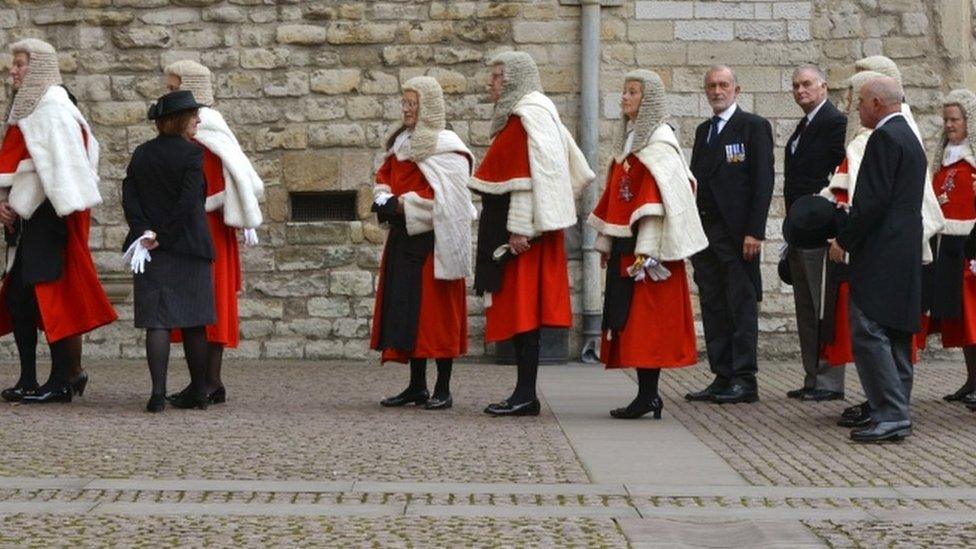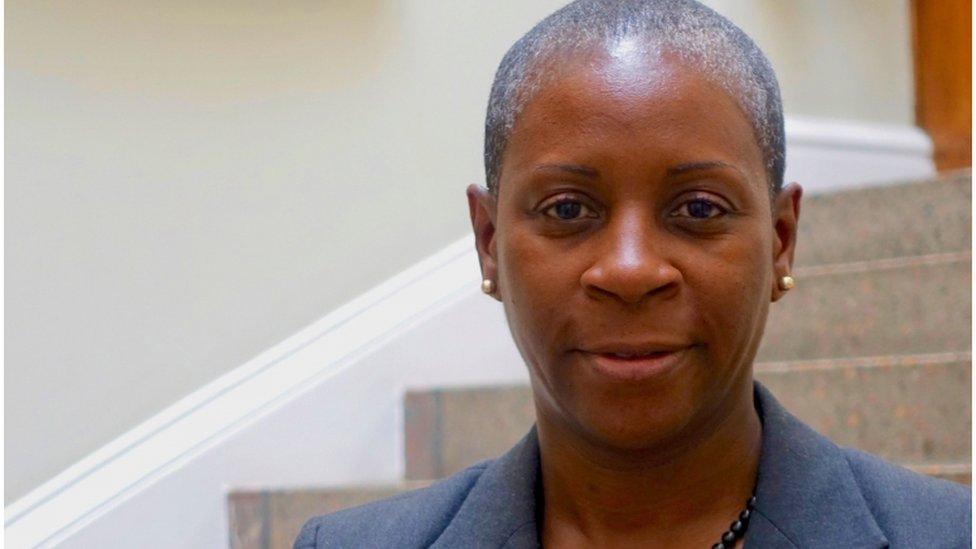Judicial diversity: Black lawyers least likely to be made judges
- Published

Judicial diversity is improving - but very slowly - and not much at all for black candidates
Lawyers from most minority backgrounds are now more likely than their white counterparts to want to become judges - but less likely to succeed.
Latest statistics reveal that while the proportion of black, Asian or minority ethnic solicitors and barristers wanting to oversee justice has significantly increased, the body that recommends who is appointed is generally less likely to put their names forward.
A breakdown of the figures for three years shows the chances of black candidates being recommended are lower than those for any other minority group.
The proportion of judges from Asian and other ethnic backgrounds has been increasing since 2014, but the proportion who are black has remained the same.
Of the 5,000 judges in post in courts and tribunals across England and Wales, 5% are Asian or Asian British, and 1% are black.
In the most senior and important roles, such as the High Court, the proportion of people belonging to ethnic minorities presiding over cases remains far lower than in other areas of justice.
The data revealing the continuing disparities, external covers 93 selection and recommendation exercises carried out over three years by the Judicial Appointments Commission (JAC).
The JAC reviews applications, external from qualified and experienced lawyers who want to switch into judicial roles in England and Wales. It recommends candidates to the prime minister, for the Queen to confirm.
Diversity targets for judges the 'wrong way'
Ethnic minority offenders 'face bias'
The annual report on judicial diversity published by the Ministry of Justice said that while change in the system was slow, due to the long careers many judges serve, data over three years had revealed "varying disparities" that needed to be more closely examined.
It found that while almost a quarter of applications for judicial positions were now coming from black, Asian and other minority groups, only 12% of those candidates made it through.
"The recommendation rates from the eligible pool for Asian candidates were an estimated 36% lower than for white candidates," said the report.
"Rates for black candidates were an estimated 73% lower than for white candidates. In contrast, recommendation rates from the eligible pool for mixed ethnicity candidates were an estimated 82% higher than for white candidates.
"All of these rate differences are statistically significant, meaning that we can be confident that there are real differences between ethnicity groups in terms of rates of progression through to the judiciary."

The slower progression for black and minority groups is concerning, the Law Society's I. Stephanie Boyce says
I. Stephanie Boyce, president of the Law Society, the professional body for solicitors, said: "When the intersection of gender, ethnicity and professional background is considered, these disparities are brought into sharper relief.
"While we are encouraged by the slight increase in the percentage of women in the judiciary, we remain very concerned as to lower success rates in the judicial applications process and the slower progression through the judiciary for black, Asian and minority ethnic groups and for solicitors."
And Derek Sweeting QC, chairman of the Bar Council, the body for barristers, said the profession didn't know why the disparities were still continuing, despite efforts to improve diversity.
"Until we understand whether there is a problem in the appointment process, or whether the issue is experience - or both - we are operating in the dark," said Mr Sweeting.
The Judicial Appointments Commission has been contacted for comment.
